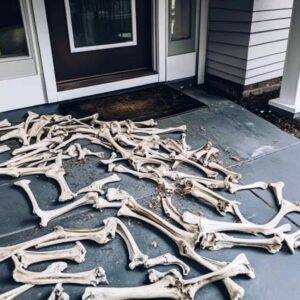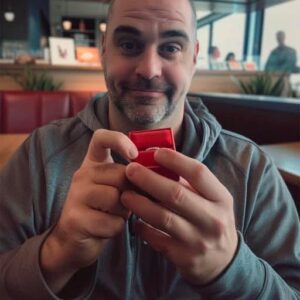Chapter 1: A Halloween of Promises and Uncertainty
It was a cool, crisp Halloween evening—a night when the air itself seemed to shimmer with the promise of magic and mystery. At the diner where I have been working for many years, the atmosphere was expected to be festive and busy, as families and trick-or-treaters flocked to enjoy the seasonal cheer. I was looking forward to a relatively normal night on the job, despite the challenges of balancing work and motherhood. However, life, in its unpredictable way, had other plans.
That evening, as I prepared for the rush of customers and the lively clamor typical of Halloween, I received unexpected news: my babysitter had quit at the very last minute. With no time to find a replacement, I had no choice but to bring my four-year-old son, Micah, to work with me. In his excitement, Micah had already dressed up in a firefighter costume—a role he adored and one that, on Halloween, promised a touch of real heroism. I had hoped that his costume would not only delight him but also serve as a small reminder of the brave work firefighters do.
I quickly found a quiet back booth in the diner where I could leave Micah with a box of crayons and a grilled cheese sandwich. I gently reminded him to stay put while I focused on managing the dinner rush. I was determined to juggle the demands of work and motherhood as best I could that night, even as my heart pounded with the mixed emotions of excitement and anxiousness.
Chapter 2: The Disappearance
The diner was bustling with activity as customers enjoyed their meals and the Halloween decorations cast playful shadows across the room. I spent the evening pouring coffee, taking orders, and ensuring that the service was prompt. Yet, amidst the organized chaos, a moment of panic struck me when I glanced toward the booth where I had left Micah. To my shock, he was no longer there.
My heart skipped a beat. I scanned the diner frantically, checking the bathrooms and even peeking into the busy kitchen, but there was no sign of him. Panic set in as I realized that my beloved son was missing. I abandoned my tasks and began a desperate search, moving from one corner of the diner to the next. Every second felt like an eternity, and I could feel my pulse quickening with each passing moment.
I retraced my steps, wondering if he had wandered off into a back room or perhaps followed someone. The diner’s lively atmosphere was suddenly overshadowed by a foreboding silence in my mind, as I struggled to reconcile the cheerful decorations with the terrifying possibility that I might have lost my child.
Chapter 3: A Surprising Encounter
After what felt like an interminable search, I finally decided to venture outside into the cool October night in search of Micah. The neon lights of the diner and the sound of chatter seemed distant as I hurried through the parking lot, calling his name with increasing desperation. It was then that I noticed something that made me pause—a figure near the edge of the lot, engaged in an animated conversation with a uniformed man.
I approached slowly, my heart pounding in my chest, until I could see that it was indeed my son. Micah, in his firefighter costume, was standing near the side of the building, speaking earnestly with a man in full firefighter uniform. The man’s expression was one of deep empathy, and as I came closer, I noticed tears welling up in his eyes. His demeanor was gentle, and he seemed completely absorbed by every word that my son spoke.
Uncertain of what was happening, I inched closer and realized that Micah was recounting a story. His small voice was filled with a mix of excitement and sadness as he spoke about his father—a man I had lost just a year prior. My husband, who had served as a firefighter, had tragically lost his life in a fire. Although Micah was too young to fully understand the circumstances, he knew only that his dad was a hero who had given everything to save lives.
The uniformed man listened intently, his eyes glistening with tears as he absorbed every word. In a quiet, choked voice, he knelt down to Micah’s level and asked, “Who was your daddy, buddy?” When Micah replied with his father’s name, the man’s tears flowed more freely, and he embraced my son warmly. “Your daddy was my friend,” he said softly. “He truly was a hero.” Then, with a tenderness that seemed to bridge the past and the present, he reached into his pocket and produced a small, silver badge. Worn yet shining, the badge was a cherished memento of my husband. “He once gave me this for good luck,” the man explained. “But now, I want you to have it.”
I stood there, witnessing this unexpected, heartfelt exchange, my heart both breaking and healing in the same breath. The firefighter’s name was Tyler, and he had once trained and worked alongside my husband. His gesture was one of profound empathy—a silent promise that even in the midst of loss, the bonds of brotherhood and shared sacrifice could endure.
Chapter 4: Shared Grief, Enduring Love
In that moment, I realized that the grief over my husband’s passing was not ours alone. It was a shared burden, carried by everyone who had known him, especially those who had worked closely with him in the line of duty. Tyler’s heartfelt display of emotion and his willingness to pass on a token of remembrance struck me deeply. The silver badge was not just an object; it was a symbol of legacy, honor, and the enduring power of love in the face of overwhelming loss.
Micah, in his innocent way, had managed to bring forth an outpouring of emotion from a man who had once been a close colleague of his father. The firefighter’s tears and gentle words demonstrated that true heroism extends beyond physical courage—it encompasses compassion, empathy, and the ability to connect with others in their moments of vulnerability.
I approached Tyler, and we spoke briefly about my husband, about the legacy he left behind, and about the community of friends and colleagues who continued to honor his memory. Tyler’s warm and sincere manner reassured me that although my husband was gone, his spirit lived on through those who had been touched by his life. In that instant, I realized that grief, while painful, also had the power to unite people in unexpected ways.
Chapter 5: The Ripple Effect of Compassion
That night, as the diner began to wind down and the Halloween festivities slowly faded into the cool darkness of October, I reflected on the unexpected encounter. My initial terror at losing my son had transformed into a poignant reminder of the value of community and the healing power of compassion. Micah’s encounter with Tyler, and the touching display of remembrance, underscored a simple yet profound truth: even in the darkest moments, love continues to shine through the smallest acts of kindness.
Over the following days, I found that the memory of that encounter stayed with me. I began to notice subtle changes in the way I viewed the world around me. The silver badge, now safely tucked away in my pocket, became a symbol of hope—a tangible reminder that my husband’s legacy was not confined to painful memories but was carried on through acts of generosity and shared humanity.
I shared the story with close friends and family, and their responses were a mix of empathy and admiration. Many expressed how the incident had restored their faith in the bonds that connect us all. In our community, where the loss of a loved one in service was a constant reminder of sacrifice and resilience, the story of Micah and Tyler resonated deeply. It became a testament to the idea that even in the face of overwhelming grief, there is always room for healing and renewal.
Chapter 6: Reclaiming a Sense of Normalcy
In the weeks that followed, life at home began to take on a new rhythm. The experience in the diner had been a catalyst for change—a moment that forced me to confront the fragility of life and the importance of cherishing every memory of my late husband. I redoubled my efforts at work, determined to find solace in my responsibilities even as I continued to navigate the unpredictable landscape of single motherhood.
At the diner, my co-workers noticed a change in me—a quiet strength that came from facing the chaos of that Halloween night and emerging with a renewed sense of purpose. I became more attentive to the needs of my children, ensuring that each day was filled with stability and care. I also made it a point to connect with colleagues who shared my grief and to support one another through our collective loss. The bonds that formed during those difficult times helped create an environment where hope could flourish despite the lingering shadows of the past.
My son Micah, too, began to exhibit signs of resilience. Although he was still too young to fully grasp the complexities of loss, his fond memories of his father and his genuine affection for Tyler—the firefighter who had shown him a piece of his father’s legacy—provided him with a sense of comfort. The silver badge, now an integral part of our family’s narrative, served as a beacon of remembrance and a promise that our loved ones continue to guide us even when they are no longer physically present.
Chapter 7: The Power of Community in Healing
As the days turned into weeks and then into months, the power of community support became increasingly evident. Friends, neighbors, and even acquaintances reached out with kind words and offers of support. Social media groups dedicated to sharing stories of loss and healing provided a space for mutual encouragement and the exchange of experiences. I attended local memorial services and community gatherings, where stories of heroism, sacrifice, and recovery were shared openly.
These interactions helped me to see that grief is not a solitary journey but a collective one. The compassionate gestures of those around me—whether it was a simple call, a handwritten note, or the willingness to listen without judgment—played a crucial role in my healing process. I began to understand that the silver badge I carried was not just a relic of my husband’s past, but a symbol of the enduring network of love and support that had come to surround our family.
In the evenings, I often sat on the back porch of our home, reflecting on the many ways in which that fateful Halloween night had reshaped my understanding of loss and legacy. I would hold the silver badge in my hand, running my fingers over its worn surface, and think about the man who had given it to Tyler—a man whose memory continued to inspire acts of kindness long after his passing. These quiet moments of introspection became a source of strength, reminding me that while the pain of loss never fully disappears, it can be transformed into a powerful force for good.
Chapter 8: A Journey of Renewal and Hope
Life has a way of testing our resilience in the most unexpected ways. The events of that Halloween, which began with frantic searches and escalated into a poignant encounter between a young boy and a compassionate firefighter, have left an indelible mark on my heart. I have come to understand that even in the midst of profound grief, there exists the potential for renewal—a chance to rebuild not only our homes but our very selves.
In the months following that unforgettable night, I made a conscious effort to embrace every opportunity for healing and growth. I reconnected with old friends, sought solace in nature, and even began writing about my experiences as a way to process the complex emotions that had emerged. My writing, which started as a personal journal, soon evolved into a series of reflections that I shared with others who were navigating similar challenges. Through my words, I discovered that vulnerability is not a weakness, but a strength—a necessary step toward transformation.
I also re-evaluated my priorities as a single mother. My children, who had been at the center of my world even before our home was shattered by loss, remained my greatest source of strength and hope. I redoubled my efforts to ensure that they felt secure and loved, creating a nurturing environment where their laughter and resilience could flourish. Every bedtime story, every shared meal, and every moment of quiet together became a testament to the power of love—a love that endures even when those we cherish are no longer with us.
At work, I channeled my creative energy into new projects, finding that the process of building something from scratch served as a powerful metaphor for my own journey. Late nights spent developing a new gaming app or refining a creative idea allowed me to momentarily escape the heaviness of my personal loss. Yet, even as I pursued these professional endeavors, the memory of that night—the sight of my son speaking earnestly with a firefighter, the touching exchange of the silver badge—remained with me, a guiding light in my quest for healing.
Chapter 9: Embracing the Legacy of a Hero
The silver badge, a small yet powerful memento given to Micah by Tyler, the compassionate firefighter, became a central symbol in our lives. It represented not only my late husband’s legacy but also the unyielding bond of love that connects us even in the wake of tragedy. I made it a point to explain to my children the significance of that badge—that it was a tangible reminder of the heroism and sacrifice that had defined their father’s life. Although Micah was still too young to grasp the full meaning of it, I knew that as he grew older, the badge would serve as a beacon of pride and remembrance—a reminder that true heroism is measured not in material wealth but in the depth of one’s character and the love one shares with others.
I also found that the silver badge sparked conversations with members of our community. Neighbors and friends would comment on its significance, and it often served as a bridge between my family and those who had known my husband. In sharing these stories, I discovered that his legacy was not confined to my memories alone; it lived on in the hearts of all who had been touched by his life. This communal recognition of his heroism provided a measure of solace—a shared understanding that even in our greatest moments of loss, the spirit of our loved ones continues to inspire and uplift us.
Chapter 10: Reflections on Grief, Resilience, and the Unyielding Power of Love
As I reflect on the journey that has unfolded since that fateful Halloween night, I am struck by the myriad ways in which grief can transform and redefine one’s life. The experience was a confluence of emotions—panic, despair, and ultimately, a deep, abiding sense of hope. It taught me that love and compassion have the power to bridge the gap between loss and renewal, to transform even the most devastating moments into opportunities for growth.
I have learned that grief is not a linear process; it is a winding path that often leads us to unexpected destinations. For me, that path led to the discovery of a supportive community, the reawakening of cherished memories, and the realization that my husband’s legacy could live on in the hearts of those who continue to honor his memory. It has taught me that even in the face of seemingly insurmountable challenges, the human spirit is capable of extraordinary resilience.
The journey has also reaffirmed the importance of cherishing every moment with those we love. As a single mother, I have come to understand that my children are my greatest treasure—an enduring reminder that even as time marches on and circumstances change, the bonds of family remain unbroken. Every laugh, every shared moment of tenderness, is a reminder that despite the pain of loss, life can still be beautiful and full of promise.
Chapter 11: Rebuilding a Future on a Foundation of Love
In the aftermath of the emotional turbulence and the legal and personal battles that followed, my focus gradually shifted toward rebuilding our future. The home that once felt like a battlefield became a canvas for new beginnings—a place where I could nurture my children, honor my husband’s memory, and rediscover the joy that had been so fleeting in the wake of our loss.
I began to invest more deeply in our community, participating in local events, supporting neighborhood initiatives, and forging connections with those who had shared in our journey. These efforts not only helped to mend the rifts that had formed in our lives but also reinforced the idea that, in times of crisis, the support of a community can be the most powerful remedy of all.
In my professional life, I sought to reclaim the creative spark that had once driven my work. I dove into new projects, channeling my energy and my experiences into innovative ideas that, I hoped, would not only bring me success but also serve as a testament to the strength of the human spirit. Every line of code I wrote, every creative concept I developed, was imbued with the lessons I had learned through heartbreak and perseverance.
Moreover, I began to share my story more widely, speaking at local parenting groups, community centers, and even on social media. I wanted others to understand that while grief and loss are inevitable parts of life, they also offer the chance for growth and transformation. I wanted to show that by embracing the love and support around us, we can overcome even the darkest moments and emerge stronger, wiser, and more connected to what truly matters.
Chapter 12: A New Understanding of True Value
Reflecting on the events that have reshaped my life, I have come to a clear realization: the true value of quality childcare and compassionate support extends far beyond a monetary figure. My husband’s initial belief that paying my mother for babysitting services was unnecessary was a stark miscalculation—a failure to understand that genuine care cannot be quantified solely in dollars. My mother, who had selflessly offered to help even at the expense of her career, provided an invaluable service that enriched our family life in ways that no amount of money could ever replace.
Her nurturing presence transformed our chaotic home into a sanctuary where love, order, and stability prevailed. The contrast between her devoted care and my husband’s dismissive attitude became a powerful lesson in the importance of respect and appreciation. I came to understand that every dollar spent on quality childcare is an investment in the future—a guarantee that our children receive the love and attention they deserve. The true cost of neglecting these essential values, I learned, is measured not in saved dollars, but in the emotional and developmental well-being of our loved ones.
This revelation has had a profound impact on me. I now advocate not only for my own family but also for other parents who might be caught between the pressures of budget constraints and the need for dependable, high-quality care. It is a message that transcends personal grievances; it is a call to recognize that the most critical investments in life are those made in nurturing and supporting our children.
Chapter 13: The Turning Point—A Lesson Learned the Hard Way
The catalyst for change came when my husband’s dismissive attitude and constant mockery of my mother’s work reached a tipping point. His repeated comments—that she was lucky just to spend time with her grandkids and that hiring her was an unnecessary expense—had slowly eroded the respect that once underpinned our family life. His harsh words, delivered with casual cruelty, revealed his true priorities, leaving me feeling betrayed and determined to set things right.
One day, after a particularly heated argument over a trivial matter, I made a decision that would alter the course of our lives. I informed my husband that I had arranged for my mother to resume her role as our primary caregiver—at a monthly rate that far exceeded what he had ever considered reasonable. My mother’s willingness to provide her expertise, care, and stability for our children became a direct challenge to his misguided notions of saving money at the expense of our family’s well-being.
Miles’s reaction was swift and filled with disdain. “Three thousand dollars a month? Just to watch your own grandkids?” he scoffed, unable to fathom that the cost of genuine care could be so high. I calmly explained that quality childcare was not an expense but an investment—one that would pay dividends in the form of a happier, more secure future for our children. Over time, my insistence, combined with the undeniable improvements in our home life when my mother was present, forced him to confront his own shortcomings. His dismissive remarks eventually gave way to reluctant acknowledgments, as he began to see that the stability and care my mother provided were worth far more than the meager savings he had envisioned.
Chapter 14: The Ripple Effect—Family, Friends, and Community
As our household began to heal, the positive impact of reinstating my mother’s caregiving role extended far beyond our immediate family. Friends and neighbors took notice of the transformation. The atmosphere in our home shifted from one of tension and neglect to one of warmth and stability. Our children, who had suffered from inconsistent care and the emotional strain of parental conflict, started to flourish. Their laughter returned, their moods brightened, and even their performance in school improved noticeably.
Word of our renewed family dynamic spread throughout the community, sparking discussions about the true cost of neglecting quality childcare. Many parents, who had previously been caught in the relentless tug-of-war between financial constraints and the need for reliable care, began to reassess their own priorities. My story resonated with those who understood that the well-being of our children was the most valuable asset we possess—one that cannot be measured solely in financial terms.
Local parenting groups and community organizations invited me to speak about my experiences. I shared how the decision to invest in compassionate, experienced childcare had transformed our lives, emphasizing that the benefits of such an investment were far-reaching and enduring. The feedback was overwhelmingly positive, with many expressing gratitude for the insights I provided and admitting that they, too, had sometimes overlooked the intangible value of care and love.
This newfound support from the community was a powerful reminder that, even in our darkest moments, we are never truly alone. The shared experiences of loss, struggle, and eventual healing created a bond among parents and neighbors—a bond that reinforced the importance of standing together in the face of adversity. Our collective story became a source of inspiration and a rallying cry for those who believed that the true measure of a family’s wealth lies not in their bank account, but in the depth of their relationships and the love that binds them.
Chapter 15: Rebuilding and Moving Forward
As the months turned into years, our lives gradually settled into a new rhythm—one defined by genuine care, mutual respect, and a commitment to the well-being of our children. I continued to work at the diner, but I also pursued additional opportunities that allowed me to channel my experiences into creative and supportive endeavors. I became more involved in local community initiatives and advocacy groups that focused on the importance of quality childcare and parental support.
Miles, too, began to show signs of change. Though his transformation was gradual and sometimes accompanied by resistance, he eventually started to acknowledge the invaluable contributions of my mother. In quiet moments, I would catch him watching her with a look of quiet admiration—a silent recognition that perhaps he had taken her presence for granted for far too long. While there were still lingering tensions and unresolved conflicts, the progress we made together was undeniable. Our home, once marred by neglect and discord, began to resonate with a newfound sense of harmony.
My children, growing up in this renewed environment, thrived. They benefited from the consistency and nurturing care provided by their grandmother, and their academic and social performance improved noticeably. Each day, as I watched them laugh, play, and learn, I was reminded that the true measure of our success as parents is not in financial savings but in the well-being and happiness of our children.
I continued to document my journey—through reflective writing, community engagement, and open conversations with those who had experienced similar challenges. My story, once filled with bitterness and regret, slowly transformed into one of hope and resilience. I learned that while mistakes cannot be undone, they can serve as powerful catalysts for growth and change.
Chapter 16: Reflections on the True Cost of Neglect
Looking back on the difficult period that reshaped our lives, I now see that the decision to fire my mother as our children’s caregiver was not merely a financial miscalculation—it was a fundamental error in judgment that cost our family dearly. My husband’s misguided belief that he could save money by dismissing the value of genuine childcare resulted in a cascade of negative consequences. The absence of my mother’s care led to chaos at home, emotional distress for our children, and ultimately, a profound rift in our family structure.
Through the ensuing struggle, I learned that the benefits of quality childcare are immeasurable. It is not simply an expense to be minimized but an investment in the future of our children—a foundation upon which their emotional, social, and academic development depends. My mother’s tireless care, her unwavering dedication, and her ability to create a nurturing environment were priceless gifts that no amount of money could ever replace.
This realization transformed the way I viewed family dynamics and financial priorities. I began to advocate not only for my own children but also for other families who found themselves forced to choose between cost-saving measures and the well-being of their loved ones. The painful lessons I learned during that period became a catalyst for broader community discussions about the true value of care, compassion, and respect in a family setting.
Chapter 17: The Power of Reconciliation and Growth
Over time, as our family worked to heal the wounds inflicted by neglect and misunderstanding, we discovered that reconciliation is possible even after the deepest of betrayals. Miles, who had initially dismissed the contributions of my mother with cold indifference, gradually came to realize the error of his ways. His journey toward self-awareness was neither easy nor instantaneous, but as he began to recognize the profound impact that genuine care had on our home, he started to change.
In heartfelt conversations and quiet moments of reflection, Miles admitted that he had taken for granted the love and support that my mother provided. He acknowledged that, while his focus on financial success had driven him to make decisions that ultimately harmed our family, there was still a path toward redemption. With genuine remorse, he pledged to match the compensation my mother received, to treat her with the respect she deserved, and to never again dismiss the critical role that caregiving plays in sustaining a happy, healthy family.
The process of reconciliation was marked by many small, meaningful steps. Our home slowly began to transform from a battleground of harsh words and unmet expectations into a space where open communication, mutual support, and shared responsibilities could take root. I learned to forgive, even as I held Miles accountable for his past mistakes. Our children, ever perceptive and resilient, gradually adapted to the new dynamics, and their laughter once again filled our home with warmth and hope.
The silver lining of our painful experience was the realization that every challenge we faced was an opportunity for growth. Our struggles taught us about the true meaning of family, the importance of prioritizing love over money, and the need to always appreciate the invaluable contributions of those who care for us. These lessons, though hard-won, have reshaped our lives and laid the groundwork for a future defined by resilience, understanding, and a renewed commitment to nurturing the bonds that hold us together.
Chapter 18: Looking Toward the Future
Today, as I reflect on the journey that has brought us to this new chapter in our lives, I am filled with both gratitude and cautious optimism. Our home, once on the brink of disintegration, now stands as a testament to the power of love, perseverance, and the importance of genuine care. The lessons learned from the painful decision to fire my mother have left an indelible mark on our hearts and have reshaped our priorities.
I now understand that quality childcare, far from being an unnecessary expense, is one of the most critical investments a family can make. It is an investment in the emotional well-being of our children, in the stability of our household, and in the legacy of love that we leave behind. My mother’s return to our home as our primary caregiver has not only restored order and warmth but has also reaffirmed the deep, enduring bonds that define our family.
Miles, though still grappling with the remnants of his past attitudes, has shown signs of genuine change. His willingness to apologize, to acknowledge his mistakes, and to work toward a more respectful and supportive dynamic is a step in the right direction. While there is still much work to be done, our journey together has taught us that it is never too late to rebuild—whether it is a home, a relationship, or our own sense of self-worth.
As I continue to move forward, I remain committed to sharing my story in the hope that it will inspire others who may be facing similar challenges. Our experience is a reminder that true wealth is not measured in dollars, but in the love we nurture, the care we provide, and the resilience we build through the trials of life. It is a call to cherish those who make our lives richer and to never take for granted the value of genuine support and compassion.
Epilogue: A Lesson in the True Value of Care
In the end, my journey from a night of frantic searches and heartbreaking discoveries to a future filled with hope and renewal has been a transformative one. I have learned that the decisions we make—whether driven by financial concerns or personal pride—can have far-reaching consequences on the lives of those we hold dear. The incident that began with a simple, yet devastating, dismissal of my mother’s worth has evolved into a powerful lesson about the true cost of neglect and the irreplaceable value of love and care.
Today, as I sit with my children in our restored home and watch my mother, Wendy, care for them with unwavering dedication, I am reminded that the most precious things in life cannot be measured by money alone. It is the quality of care, the strength of our relationships, and the depth of our compassion that truly define us. My husband’s initial mockery, which once seemed justified in his narrow view of financial prudence, has now been replaced by a deeper understanding of what it means to value the people who make our lives whole.
This is our story—a journey of heartbreak, struggle, and ultimately, redemption. It is a testament to the enduring power of family, the importance of standing up for what is right, and the belief that even the most painful decisions can lead to growth and healing. I hope that by sharing our experience, others will be inspired to look beyond mere numbers and recognize that the true wealth of life lies in the love, care, and respect we offer one another.
Adrian Hawthorne is a celebrated author and dedicated archivist who finds inspiration in the hidden stories of the past. Educated at Oxford, he now works at the National Archives, where preserving history fuels his evocative writing. Balancing archival precision with creative storytelling, Adrian founded the Hawthorne Institute of Literary Arts to mentor emerging writers and honor the timeless art of narrative.





